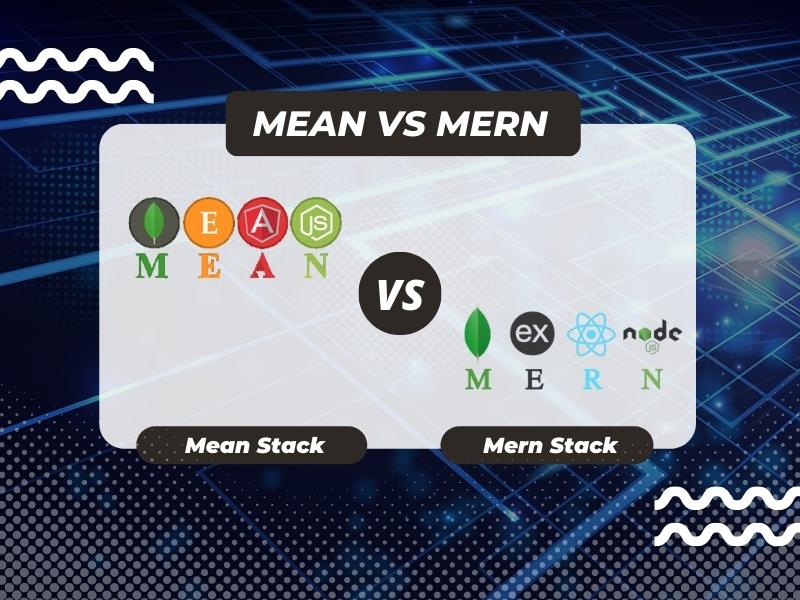Are you a web developer trying to decide Comparison of MEAN stack and MERN stack for your next project? Look no further! In this blog post, we will compare these two popular technology stacks, helping you make an informed choice that aligns with your project’s needs.
Introduction
In the vast world of web development, numerous technology stacks are available, making the decision-making process daunting. Among these, the MEAN and MERN stacks stand out as powerful contenders. While they share some similarities, they have distinct features that cater to different project requirements. Let’s delve into a comprehensive comparison of these two stacks, analyzing their key elements such as front-end frameworks, languages, scalability, learning curve, architecture, productivity, and security.
Understanding MEAN Stack
MEAN stack is an acronym representing MongoDB, Express.js, Angular, and Node.js. Angular, a front-end framework, empowers developers to build dynamic and responsive user interfaces. On the server side, Node.js and Express.js create a fast and scalable web application. MongoDB, a NoSQL database, stores the application’s data in JSON-like documents.
Exploring MERN Stack
MERN stack shares similarities with MEAN, but it has one key distinction – it swaps Angular with React.js for front-end development. React.js is known for its simplicity and growing popularity in the web development community. On the server side, MERN also uses Node.js and Express.js, while MongoDB remains the database of choice.
History of Languages
AngularJS is a front-end JavaScript framework developed by Google. It was first released in 2010. AngularJS aimed to simplify front-end development by providing a framework for building dynamic web applications with data binding and declarative templates. React.js: React.js is a front-end JavaScript library developed by Facebook. It was released in 2013. React.js introduced the concept of a virtual DOM, allowing for efficient updates and rendering of user interfaces.
Comparing Front-end Frameworks
The primary difference between the two stacks lies in their front-end frameworks. Angular in MEAN stack is more mature and suitable for larger enterprise-level projects. Its built-in features can be advantageous for complex applications. In contrast, React.js in MERN stack is gaining traction for its simplicity and ease of use, making it a popular choice for smaller applications and projects.
Language and Learning Curve
Both stacks utilize JavaScript as their primary language, making it convenient to work seamlessly across the entire development cycle. However, MEAN’s Angular has a steeper learning curve compared to MERN’s React.js. React’s flexibility and configuration options provide a smoother learning experience, especially for developers familiar with JavaScript.
Architecture and Productivity : Comparison of MEAN Stack and MERN Stack
MEAN follows the Model-View-Controller (MVC) architecture, which promotes a clear separation of concerns and simplifies code maintenance. On the other hand, MERN follows a three-tier architecture, dividing responsibilities between the client-side (View), the server-side (Model and Controller), and the database. While MEAN provides more out-of-the-box features for quick development, MERN allows developers to choose tools and configurations for greater flexibility and customization.
Scalability and Security
Both stacks offer excellent scalability and can handle large-scale web applications. MEAN’s longer presence in the market grants it a more substantial community and better-established security practices. MERN’s popularity is on the rise, and it offers developers more control over security measures.
Community Support
MEAN has a more established community with a wider range of third-party resources, plugins, and libraries. However, MERN’s community is growing rapidly, providing access to a wealth of tutorials, resources, and solutions.
Conclusion : Comparison of MEAN Stack and MERN Stack
Choosing between the MEAN and MERN stacks is a crucial decision that depends on the specifics of your project. If you prefer Angular’s robustness and maturity for larger projects, MEAN might be the right choice. However, if you favor React’s simplicity and a thriving community, MERN could be your go-to stack. Remember to consider factors like project complexity, scalability, and your familiarity with the front-end frameworks.
In conclusion, both MEAN and MERN stacks offer powerful solutions for web development, ensuring scalability, flexibility, and excellent third-party support. Regardless of your choice, mastering either stack will equip you with valuable skills to build impressive web applications. So, analyze your project’s requirements and dive into the world of MEAN or MERN, embarking on an exciting journey of web development excellence!
Connect with vdoit for Best IT Services

